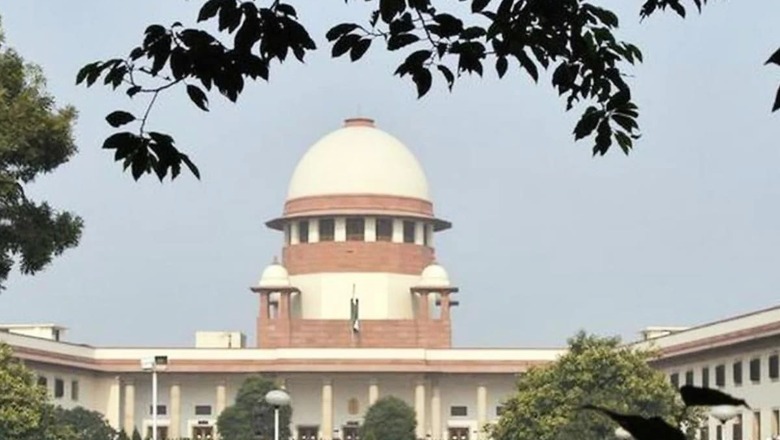
views
The Supreme Court Monday reiterated that persons with disabilities (PwD) cannot be denied reservation in promotions in government jobs as it upheld a Kerala High Court order granting the benefit to a woman last year.
The top court said that identification of posts for the purpose of reservation had to take place immediately after the Persons with Disabilities (Equal Opportunities, Protection of Rights and Full Participation) Act, 1995 but a resistance to this is obvious from the “delaying tactics” adopted by most of the government authorities in truly implementing the intent.
It said that sometimes it is easier to bring a legislation into force but far more difficult to change the social mindset which would seek to defeat the intent of the law. A bench of Justices Sanjay Kishan Kaul and R Subhash Reddy upheld the Kerala High Court order of March 9, 2020, by which it had held reservation in promotion to a woman with disability.
The SC bench said, “We are of the view that the course of action followed by the High Court in the impugned order is salutary and does not call for any interference.” The top court said that what seems to emerge from the case is that Kerala has not implemented the SC judgments in the Rajeev Kumar Gupta and others versus the Union of India case (2016), and in the Siddaraju versus State of Karnataka case (2020), in which it was held that reservation to PwD would be applicable even in promotion in government jobs. The bench said, “Thus, we consider it appropriate to issue directions to the State of Kerala to implement these judgments and provide for reservation in promotion in all posts after identifying said posts. This exercise should be completed within a period of three months”. It said, “We are making it time bound so that the mandate of the Act (The Persons with Disabilities (Equal Opportunities, Protection of Rights and Full Participation) Act, 1995) is not again frustrated by making Section 32 as an excuse for not having identified the post.”
The top court noted that the Rights of Persons with Disabilities Act of 2016 has now taken care of how to deal with the aspect of reservation in promotion. It dealt with the question of whether reservation under provisions of the 1995 Act is dependent upon identification of posts as stipulated by the law.
The top court said that there can be little doubt that it was never the intention of the legislature that the provisions of the Act would be used as a tool to frustrate the benefits of reservation under the 1995 law. “In fact, identification of posts for purposes of reservation had to take place immediately after the 1995 Act. A resistance to such reservation is obvious from the delaying tactics adopted by most of the government authorities in truly implementing the intent.
It thus shows that sometimes it is easier to bring legislation into force but far more difficult to change the social mind set which would endeavour to find ways and means to defeat the intent of the Act enacted and Section 32 was a classic example of the same”, the bench said.
The top court had appointed senior advocate Gaurav Agrawal as amicus curiae to assist it in the matter and framed four questions including whether the 1995 law mandates reservations in promotions for persons with disabilities? It said, The legislative mandate has to be understood in the context as it provides for equal opportunity for career progression, including promotion. Thus, it would be negation of the legislative mandate if promotion is denied to PwD and such reservation is confined to the initial stage of induction in service. This would in fact result in stagnation of the disabled in a consequential frustration.
It said that, thus, the total number of vacancies in the cadre strength would include the vacancies to be filled in by nomination as well as by promotion and in our view, the aforesaid should put at rest the controversy insofar as the mandate of 1995 Act qua promotion is concerned. It said that in its earlier verdicts, the SC had mandated the identification of posts for purposes of reservation and a PwD has to be considered for promotion along with other persons working in the feeder cadre.
It said that there cannot be any methodology used to defeat the reservation in promotion and once that post is identified, the logical conclusion would be that it would be reserved for PwD who have been promoted. The top court said that the 1995 Act does not make a distinction between a person who may have entered service on account of disability and one who may have acquired disability after having entered the service. Similarly, the same position would be with the person who may have entered service on a claim of a compassionate appointment. The mode of entry in service cannot be a ground to make out a case of discriminatory promotion, it said. The top court had noted that the woman was appointed in 1996 to the post of typist/clerk in the police department on compassionate grounds after her brother had passed away during service.
The woman has claimed that she was entitled to promotion as a Senior Clerk with effect from July 1, 2002 with all consequential benefits and as a cashier with effect from May 20, 2012 with all consequential benefits and thereafter as Junior Superintendent with effect from the date of her entitlement.
Read all the Latest News, Breaking News and Coronavirus News here.




















Comments
0 comment